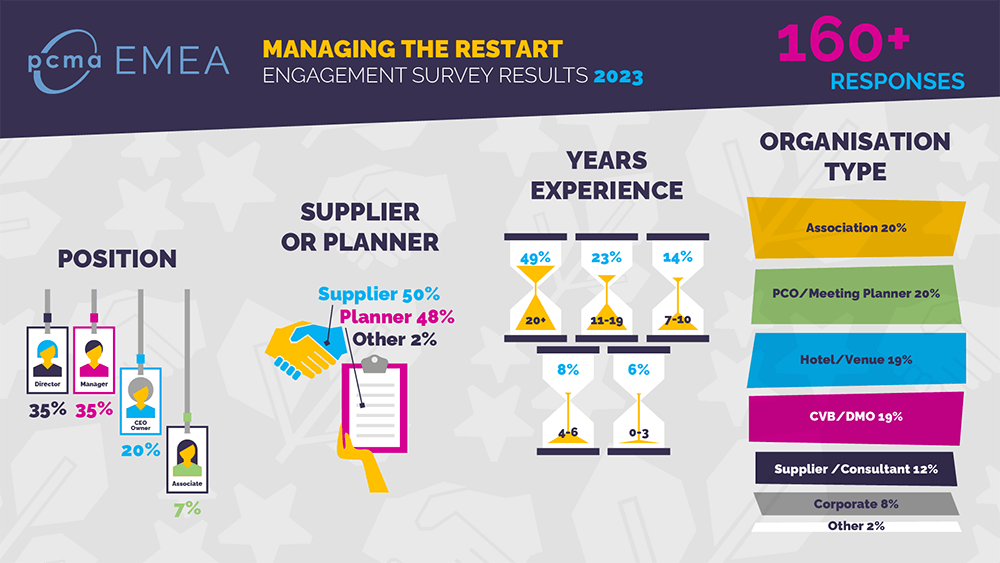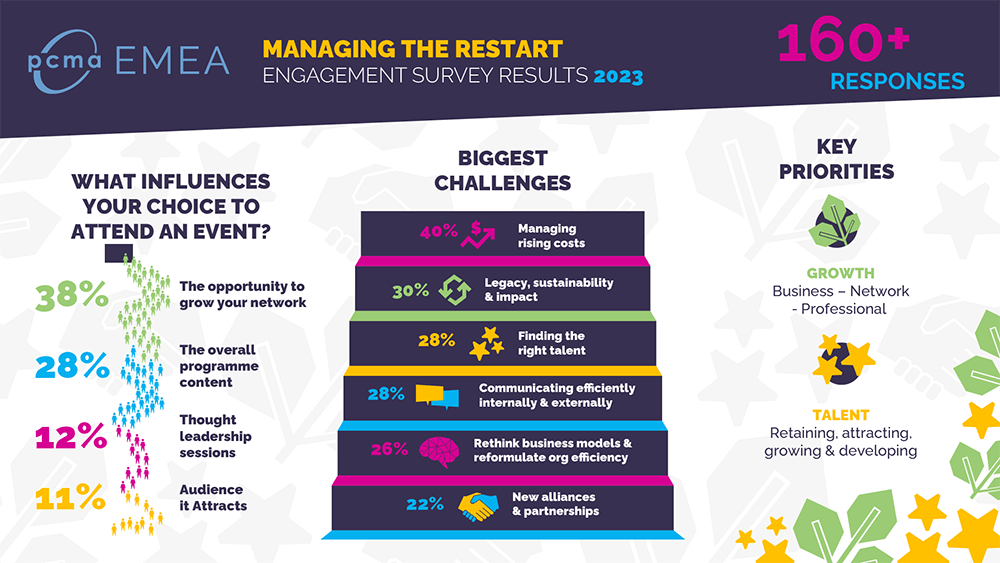Have you ever taken a personality test and answered questions that seem to ask the same thing but were phrased in different ways? That’s not your imagination — it’s done deliberately as a way to measure how strongly you feel about something.
Jaimé Bennett, managing director EMEA at PCMA, didn’t set out to follow the personality test model when she designed this year’s Annual EMEA Engagement Survey, which was conducted in late February. But taken together, the responses to three of the survey questions shine a bright light on the issues that matter most to 162 event professional respondents, eight out of 10 of whom live in Europe, and 7 out of 10 of whom have more than a decade of event industry experience.

In the first open-ended question, respondents were asked to type in their two key professional priorities for 2023/2024. For the next question — What are the biggest challenges you are currently facing? — they were to choose three out of 18 options. And the third question, also open-ended, asked survey takers to identify the obstacles that stood in the way of them achieving their goals, or the things that slow down their work.
What was the crossover in those three questions? Let’s start with the top challenges: managing rising costs (40 percent); legacy, sustainability, and impact (30 percent); the option of finding the right talent and another option of communicating efficiently internally and externally were both tied at 28 percent; followed closely by rethinking business models and reformulating organizational efficiency (26 percent). Forming new alliances and partnerships was ticked by 22 percent of respondents.
While rising costs was clearly the biggest challenge cited by respondents, budgeting, controlling costs, and streamlining operations were not often mentioned as areas of professional focus, a sure indication that the increasing price of doing business is seen as being largely outside event professionals’ control and cost containment is not a viable strategy.
And while sustainability came in second as a challenge, it didn’t show up as a major priority that respondents were focused on, although it was mentioned several-dozen times. The split between planners and suppliers is especially apparent when it comes to this area, with one-third of suppliers and only 15 percent of planners saying that legacy, sustainability, and impact is a top challenge. Perhaps that is due to suppliers feeling increased pressure from planners to offer more sustainable solutions at events and planners expecting suppliers and venues to shoulder the largest share of that responsibility.
What did surface as both a major concern and an area of focus is talent acquisition and retention. One respondent wrote that s/he is focusing “on things that really matter — HR, training, and team building.” This, of course, makes perfect sense given how the pandemic caused the business events industry to slash jobs and how organizations are working to restaff as in-person events return. But those who manage teams — nine out of 10 respondents were directors, managers, or CEOs — also expressed concerns about how their current staff is faring. The only area one respondent said s/he was focused on was “looking after the mental health of employees.” That respondent was likely a planner: 16 percent of planners said the wellness and mental health of staff was among their biggest challenges while only 4 percent of suppliers said the same.
Understandably, the largest area of focus is growth, expressed in terms increasing the reach and revenue of the organizations respondents work for, and in finding new opportunities — which taps into the area of forming new alliances and partnerships that one out of five respondents said was a key challenge.

What stops event professionals in their tracks? Everyday stumbling blocks run the gamut from a lack of capacity (resources, time, and talent) and efficient processes to dealing with complexities, uncertainties, a negative work culture, email overload, tech updates, losing and training new staff, and an organizational resistance to change. One responded simply said “life.”
Burnout is spelled out only once, but it’s clear when skimming this long list of complaints that the main problem industry professionals are struggling with can be distilled down to having too much to do and not enough resources. Just a few direct quotes that illustrate this: “too many calls and not enough thinking,” “work overload that doesn’t leave time for learning and exploring,” “the [number] of different activities that force you to jump from one thing to another,” “requests to support activities/projects which diverge from our team objectives,” “unrealistic expectations,” and “[no] time to think. Rat race over innovation.”
Is it any wonder that the events industry has a talent crisis? After several years of weathering the pandemic, the demands on event professionals to make their organizations and the industry whole seem overwhelming. At the same time, we’re still coming to grips with how COVID changed our world view and gave us less of an appetite to join the rat race. As one respondent, who waxed existential when sharing what s/he will focus on this year and next, put it: “Understanding my main purpose in life and how to align my professional life with it.”
Michelle Russell is editor in chief of Convene.
